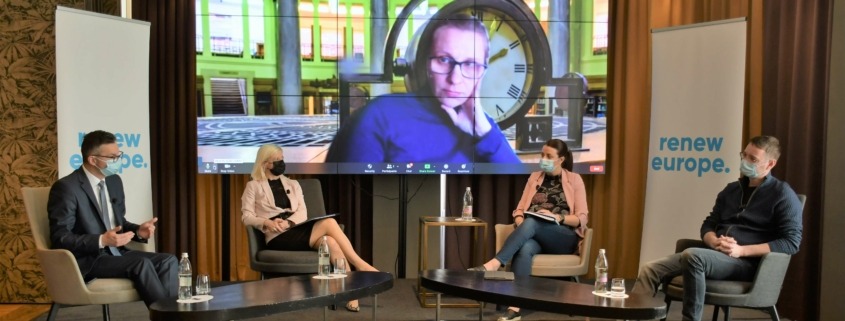MEP Irena Joveva organized a round table on the labour market challenges affected by COVID-19 and demographic changes. Her interlocutors were Jana Javornik, PhD, Associate Professor at the University of Leeds, researcher and former Director-General of Higher Education, the Republic of Slovenia at the Ministry of Education, Science, and Sport, Government of Slovenia; Ksenija Klampfer, M.A., former Minister of Labour, Family, Social Affairs, and Equal Opportunities; Jure Knez, PhD, President of the Slovenian Entrepreneurs’ Club, and co-founder and Technical Director of Dewesoft; Marjan Šarec, President of the LMŠ.
Facing the pandemic has led to rising unemployment in the European Union. MEP Joveva and her colleagues were looking for answers on how to increase the value per employee and the resilience of the workforce to possible new turbulences and digital and green industrial revolutions in the process of economic recovery.
Marjan Šarec pointed out that Slovenia is still heavily involved in the field of services and as an exporter in the automotive industry. He also added: “It will be important to see where Slovenia finds itself in the challenges of green nature and how it will cope with this transformation. On issues that are not ideological, an agenda should be set several mandates in advance, at least twelve years, and should also be followed through.”
The labour market has responded quickly to the pandemic. Still, the situation has also exposed the full extent of the problems of precarious employment situations and further demonstrated how dangerous it is, as it can quickly plunge individuals and their families into social hardship. They agreed that subsidizing part-time work and reducing waiting times are measures that have already proved their worth during the recession but that active employment and lifelong learning policies are even more important.
“The economy is moving from a knowledge economy to an economy of skills. We are entering a time when a degree will no longer be enough. Technological development is brutal, and if a worker cannot keep up with it, it will be difficult to keep a job,” Ksenija Klampfer stressed, and was also critical of employers: “It is shocking that employers in Slovenia invest very little in staff training, and no longer train people over the age of 43 at all.”
Jure Knez explained that Dewesoft continues to train its engineering staff for three to five years, so if employees left, it would be costly for them.
Wage inequality is also becoming more and more exposed, as the pandemic has affected those parts of the economy that employ a high percentage of women: trade, hospitality, tourism, services. Jana Javornik also sees the problem in the general climate in Slovenia, which is becoming very hostile to gender equality and equality in general. “At the same time, the epidemic raises, very radically, the question of care work — which algorithms cannot regulate, but has actually to be done by someone. So there is still a need for female labour in particular, and politics must ensure that working conditions in this sector improve,” she added.
Irena Joveva also pointed to demographic change: ‘The old continent is ageing. Europeans are expected to account for only 4% of the world’s population by 2070. On the European Parliament’s Committee on Employment and Social Affairs (EMPL), where I am a substitute member, we are advocating the upskilling and retraining of older and vulnerable groups so that they can adapt to the labour market.”
Jana Javornik’s opinion is that the ageing population can be a challenge of its own, with young people bringing the agility and older people bringing knowledge and wisdom, but we just need to adapt our ways of working. The so-called ageism in our society is not only directed against the old, but also the young. The agility of the employment and retirement system is crucial, but unfortunately, it is still very rigid in Slovenia.
As Knez pointed out, we have made it harder for the elderly to be employable themselves by not offering older workers the chance to stay happy. As an example of adaptation, he cited the four-day working week he allows one of his top (senior) engineers.
“The Employment Service is becoming a bridge between employment and waiting for retirement,” added Ms Klampfer, who sees trust between worker and employer as the holy grail of current HR policy: “We need to adapt the ergonomics of workplaces, eliminate stereotypes against older people, improve workplace attitudes, and introduce an HR policy that provides training for older people,” she summarized.
In the part of the conference devoted to finding solutions for increasing added value, Joveva mentioned the paradoxical fact that the Jožef Štefan Institute has an international centre for artificial intelligence, recognized by UNESCO, while the country as a whole is lagging behind the European average in digital development. Jana Javornik sees brain drain as having positive consequences, as workers acquire additional competencies abroad, but the brain has to circulate: “For this to happen, we need to be an immigrant-friendly society, which Slovenia is not, and we do need to have a labour market that is properly adapted for the highly skilled segment.” Knez also sees more added value in linking the economy with the education system: “We can anticipate and adapt to trends and developments five to seven years in advance. These are specific skills that cannot be acquired only in universities.” Finally, Jana Javornik pointed out another stereotype: “The modern labour market employs at least four generations, and it is time to stop talking about digital illiteracy in Slovenia. We need to be aware that the internet was invented by the boomer generation, who is now finishing their careers and working life.”





Leave a Reply
Want to join the discussion?Feel free to contribute!